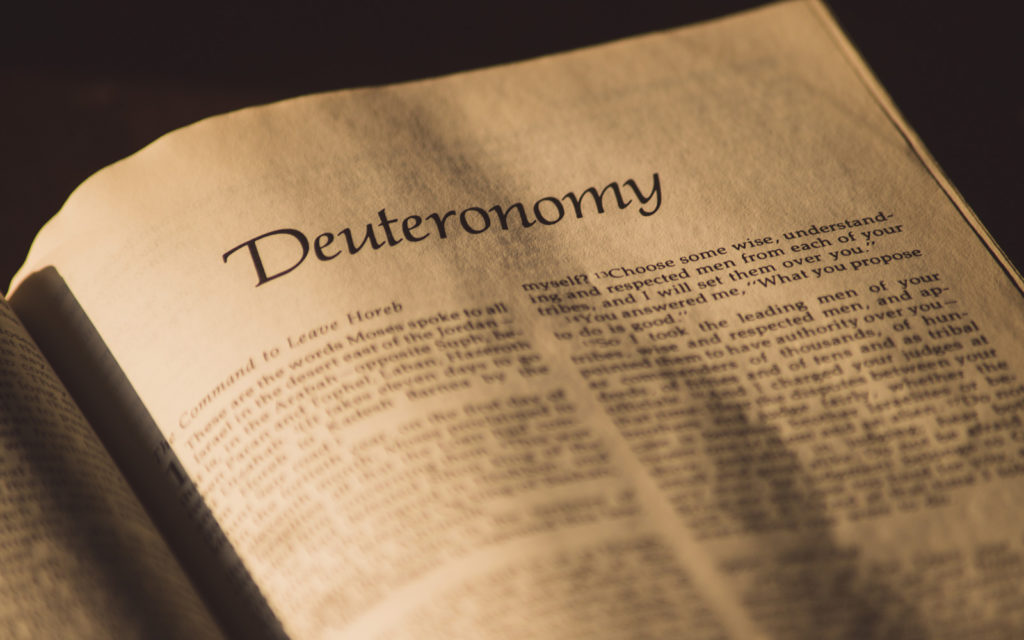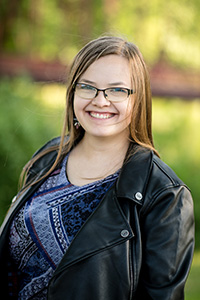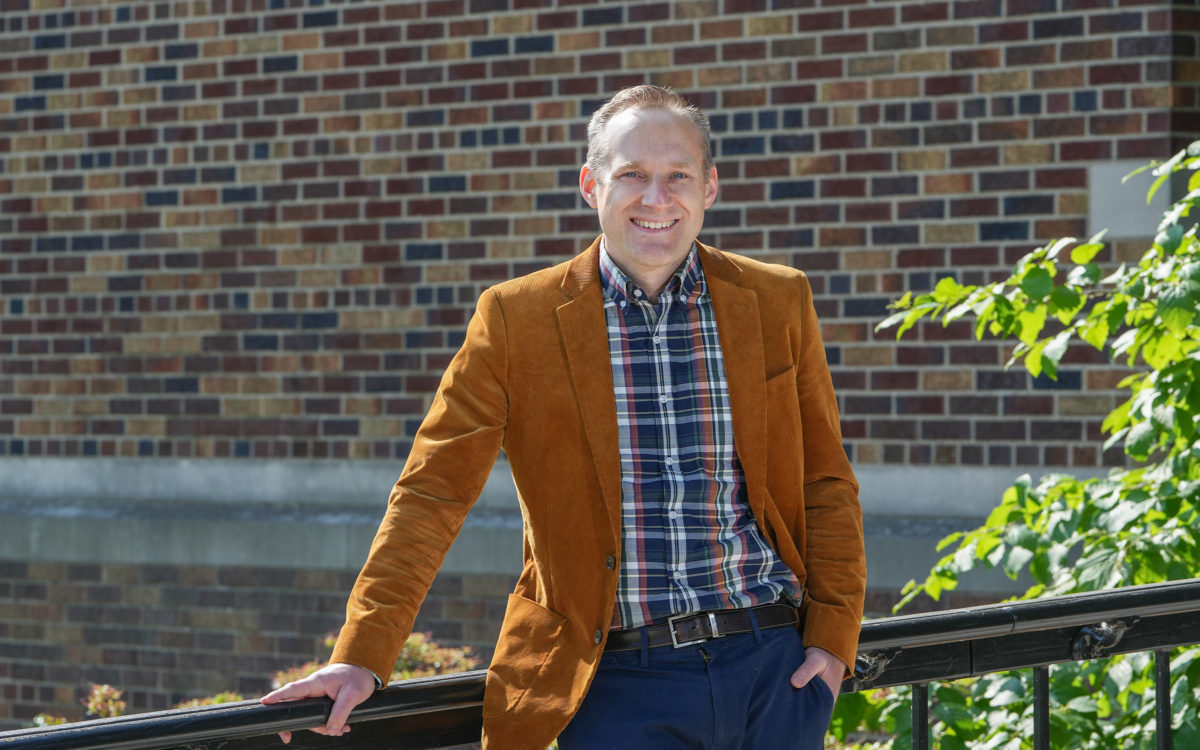Ideas and the Test of Time
Dr. David DeJong
Tracing and analyzing how texts have been interpreted over time is Dr. David DeJong’s niche in biblical studies. The relatively new field is called “reception history” — reception meaning how a text was “received” by those who heard it or, in later eras, read it. What public discourse took place? What nuanced understanding developed? How did it all play out in faith communities?
In his 2022 book A Prophet Like Moses (Deut. 18:15, 18): The Origin, History, and Influence of the Mosaic Prophetic Succession, the assistant professor of religion explores how Deuteronomy’s concept of “a prophet like Moses” was interpreted from the seventh century B.C. through 100 A.D. in Judaism and Christianity.
Considering disparate, narrowly focused previous scholarship layered with his own readings of ancient texts, he builds the through-story of how Jews in ancient times, and later, the early Christian church, grappled with what it means for someone to be “a prophet like Moses.” His book is the first comprehensive treatment of this passage’s “after-lives” through the centuries.
“The lord your God will raise up for you a prophet like me from among you, from your fellow Israelites. You must listen to him… I will raise up for them a prophet like you from among their fellow Israelites, and I will put my words in his mouth. He will tell them everything I command him.”
DeJong, who arrived at Hope in 2020, teaches various courses on the Old Testament. He also teaches an introductory course called “God and Humanity,” which surveys the portrayal of the divine-human relationship in ancient and modern texts. In Introduction to the Old Testament (the whole thing in one semester!) he spends just 20 minutes on the concepts in his book. It’s technical, and he expects it will be read largely by scholars; he doesn’t want his Hope students to “glaze over.” He suggests, though, that pastors and teachers might find his chapters on Luke-Acts and John an interesting look at how New Testament authors worked with categories drawn from the Hebrew Scriptures.
He notes that some prophets in the ancient world were analogous to modern national security advisors: essentially, counselors for the king. “The danger of false prophets was very real in terms of leading the whole nation to disaster,” he says. Consequently, there was an urgent drive to discern who was authentic. DeJong proposes two models to describe the ways people assessed whether self-proclaimed prophets measured up.
“The traditional model was that the charismatic spirit of Yahweh can fall on anyone,” he says. In this charismatic model, a prophet was “authorized” by people’s trust, based on the person’s words and deeds, that the private encounter with Yahweh that the prophet described — the prophet’s “call” — took place.
He calls the other model genealogical, but doesn’t mean it biologically. “It’s grounded in whether they conform to Mosaic Torah, the laws and teachings passed on by Moses. Do they advocate service of the one true God? Do they promote fidelity to Yahweh, and do their words stand the test of time? There’s an empirical test that’s important as well, which is, does what they say accord with reality? Is it going to happen?” Early Christians leaned into this, he says, because “it is quite important for New Testament thinking about Jesus to understand how Jesus and John the Baptist function as picking up the mantle of Moses. It was very important to argue that Jesus is in Moses’ genealogical line.”
The charismatic model destabilizes a bit, DeJong says; the genealogical one offers a sense of tradition, and in it Jesus and the prophets are inspired interpreters. “I argue that Deuteronomy puts in the genealogical model, but you always need the charismatic model, too. Otherwise, it’s too tied to a specific institution,” he adds. Together, dynamically, the two models demand careful thought.

“Deuteronomy wants to give people tools to be skeptical of prophets,” he comments, “and that’s a really liberating moment in religion in general.”
For all the vast differences between the cultural realities of the era when Deuteronomy emerged and the present day, DeJong emphasizes a crucial similarity: revolutions in communication.
For the modern world, it is the shift from the printed word to digital communication. “We’re living in this time when truth is so contested,” he says. “We have gone into the digital age and our brains don’t really know how to keep up. Our understanding of what is true is being corrupted by that. In general, we don’t see that people are learning to be critical thinkers.”
In a strikingly similar context, the authors of Deuteronomy composed the book during the transition from orality to the written word. “It was a cultural transformation that was at least as radical as ours, maybe more so. It was about knowledge, and how it’s acquired, and how we know what we know to be true,” DeJong says.
So in Deuteronomy, “you have the scribes trying to train the people in rationality, in critical thinking, and trying to teach how they can discern or assess using empirical and ethical modes of reasoning,” he continues. “They are arguing for a faith that is compatible with what human reason can understand about creation and about God and about humanity. Deuteronomy is really relevant for thinking about contemporary debates about faith and reason.”

His book project now put to bed, DeJong is engaged in a new one. Analyzing Old and New Testament texts, he is focusing on how the prophet Elijah was redefined, redeployed and used in different contexts as a legitimizing figure. This year he was assisted by Lydia Harrison ’23, who edited Hope’s student journal of Christian thought, The Bell Tower, and begins graduate study this fall at Duke Divinity School. “It has been a really rewarding experience to work with Lydia, who is such a promising biblical scholar, and I hope to continue to involve undergraduates in my research going forward,” DeJong says.
Dr. David DeJong notes that some prophets in the ancient world were analogous to modern national security advisors: essentially, counselors for the king. “The danger of false prophets was very real in terms of leading the whole nation to disaster.”

